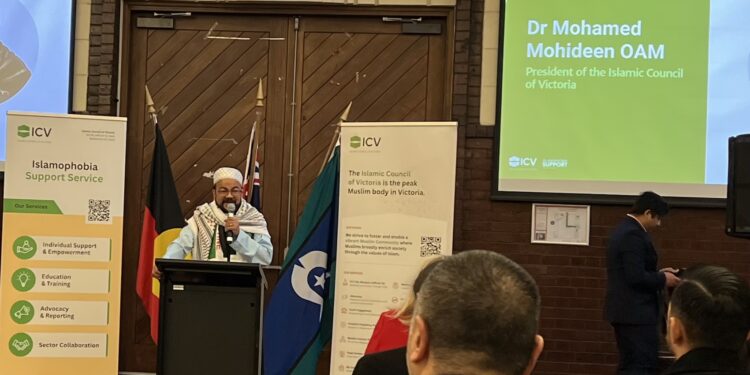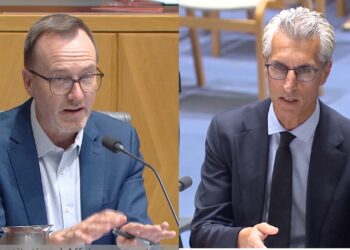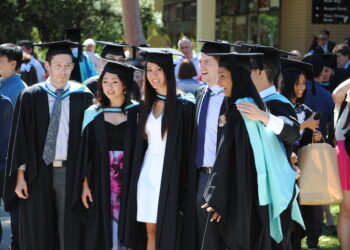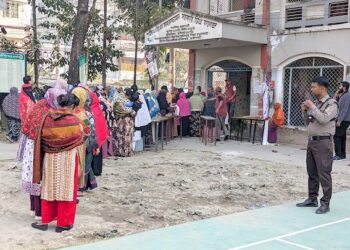The Islamic Council of Victoria’s inaugural Summit on Islamophobia brought together community leaders, academics, and advocates on 16 August 2025 to address what speakers characterised as systemic anti-Muslim racism embedded in Australian institutions, media, and society.
The summit’s most powerful moment came from former Guardian journalist Antoun Issa, co-founder of DeepCut News, who detailed how mainstream media organisations systematically silenced Arab and Muslim journalists during coverage of the Gaza conflict.
“I was told that I was too passionate, I was told from so many terms that my proximity to the conflict meant that I couldn’t sufficiently distance myself to do my job as a journalist,” Issa told attendees. “My knowledge and my years of experience were dismissed as passion related to my identity.”
Issa, who resigned from The Guardian after what he described as being repeatedly sidelined despite his extensive Middle East reporting experience, argued that media coverage suffered precisely because of this exclusion. “Audiences can see this disconnect between the reality on the ground and news organisations doing their best to obscure that reality,” he said.
His presentation formed part of a comprehensive day-long program examining various aspects of anti-Muslim discrimination, from healthcare to universities to geopolitical impacts on diaspora communities.
Leadership Calls for Direct Action
ICV President Dr Mohamed Mohideen OAM opened proceedings by reframing the discussion, describing Islamophobia as “Anti Muslim Racism” – what he called “a more direct reference to the specific kind of discrimination it is.” Drawing from personal experience and community testimonies, Dr Mohideen highlighted the particular targeting of Muslim women through visible markers of their faith.
Minister for Multicultural Affairs Hon. Ingrid Stitt emphasised the importance of belonging and feeling valued, while Melbourne Lord Mayor Nicholas Reece shared a personal account of visiting a young Muslim woman who had been racially abused, had her hijab grabbed, and been spat upon.
Academic and Healthcare Perspectives
The summit featured comprehensive academic analysis, with Professor Dr Aziz Rahman from Federation University presenting findings from his research on “Islamophobia: Experience of Muslim and non-Muslim healthcare professionals in Australia,” revealing discrimination within the healthcare system.
Dr Yassir Morsi from La Trobe University delivered what attendees described as a “poetic and powerful presentation” on the language of Islamophobia and identity politics. His address notably connected local discrimination to global conflicts, particularly Gaza, expressing his inability to participate in celebrations of multiculturalism while “so many of his brothers and sisters in faith are being starved, maimed and murdered.”
Dr Morsi distinguished between systemic structural Islamophobia across politics and media (the “big I”) and everyday casual racism (the “small i”), arguing that the latter finds legitimacy under protection of the former.
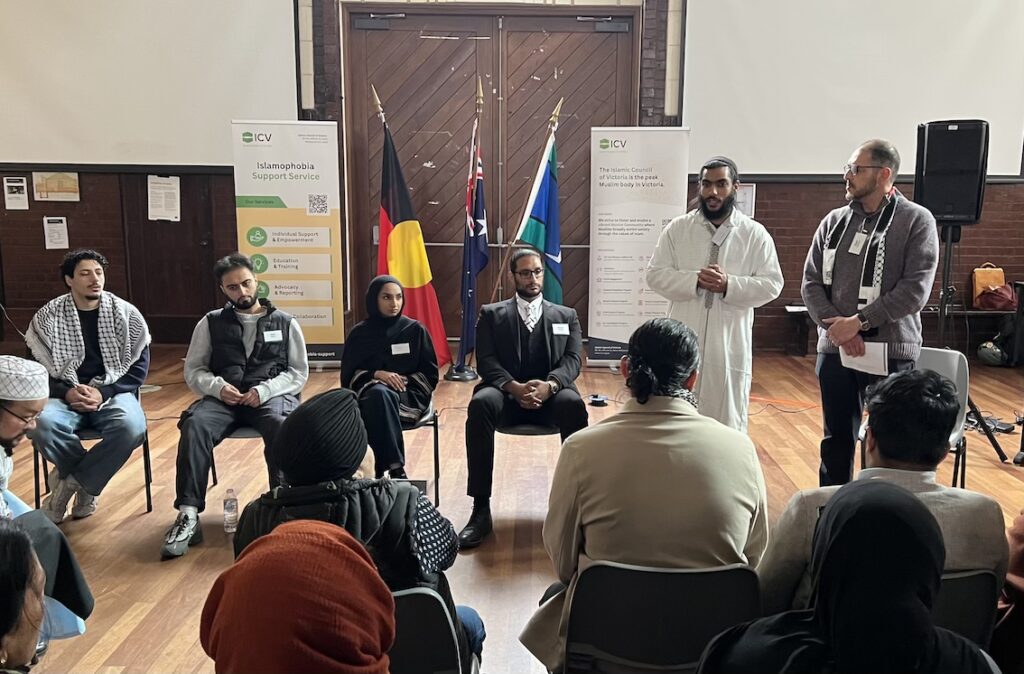
University Discrimination Revealed
A particularly confronting panel featured student representatives from the University of Melbourne, RMIT University, Swinburne University of Technology, Monash University, and Victoria University, moderated by former ICV President Adel Salman. Student leaders detailed specific instances of institutional discrimination, describing how they and their Muslim collectives were “let down, humiliated, and seen as less deserving of respect than other groups.”
One student’s comment particularly resonated with attendees: “Worse than the incidents of racism, was the hope, that they could actually change something, do something, that would make people see.” The unspoken implication was the psychological cost of repeatedly crushed expectations for institutional change.
Comprehensive Workshop Program
The summit included three concurrent workshops addressing different aspects of anti-Muslim discrimination:
- Islamophobia & Gender – facilitated by ICV Board Member Arfa Sarfaraz Khan, focusing on the disproportionate impact on Muslim women
- Drivers of Islamophobia – led by Associate Professor Mario Peucker from Victoria University’s Institute for Sustainable Industries & Liveable Cities, examining the roots of discriminatory attitudes including misinformation and social media manipulation
- Political Voice and Power – facilitated by Ghaith Krayem, National Spokesperson for Muslim Votes Matter, addressing strategies for claiming political space
Systemic Reporting Challenges
A panel on “Understanding the System – Reporting and Escalating Incidents” brought together Lauren Matthews from VEOHRC, Maha Sukkar from Victoria Police, Emma Antonetti from Whittlesea Community Connections, and Nancy Higazy from Islamophobia Register Australia, moderated by Nina Springle.
The day concluded with a panel examining “The Impact of Geo-Political Tension on the Islamic Diaspora,” featuring representatives from Somali, Palestinian, Rohingya, Syrian and Kashmiri communities alongside Maria Dimopoulos, CEO of Settlement Council of Australia.
Media Landscape Transformation
Issa’s presentation highlighted broader implications for Australian media, citing a recent Gipps Hall poll showing audience number drops across mainstream news sites, with The Guardian experiencing a 21% decline. He argued this represented consequences of failing to embrace authentic diverse perspectives.
“The last two years have shattered the illusion of diversity and inclusion in the media,” Issa said. “They wanted our faces so long as we remained in junior positions. They wanted our names so long as we adhered to their worldview.”
Call for Broader Coalition
Summit participant Nandini Sen Mehra from Hindus for Human Rights reflected on the broader implications of the discussions. “Often in the work that we do, in bridging across borders, in combating ethnonationalism and anti minority sentiment within our own communities, we too lose sight of the inherent humanity of those affected, and the enormous human cost of racism,” she told NRI Affairs.
“The Summit was timely and meaningful, and reinforced the need to work collaboratively, extend our solidarity beyond our own interests, and gain the confidence to stand up to racism, to xenophobia, and the negative stereotyping that is increasingly being normalised,” Sen Mehra said.
She emphasised that “the next step from this could be to include other voices against Islamophobia from within the Anglo-Australian, Jewish, Hindu, Sikh, and Christian communities. As we listen, dialogue, have difficult and honest conversations, we can find a collective path forward, not only against Anti Muslim Racism but against all kinds of bigotry, hate and othering.”
The event also marked the launch of “Islamophobia in Victoria: Trends, Impact, Action” – a comprehensive report by ICV Islamophobia Lead Radhiya Fanham outlining data and strategic responses to anti-Muslim discrimination across the state.
Summit Coordinator Nina Springle closed proceedings by emphasising the need for collaborative action, extending solidarity beyond individual community interests, and building confidence to stand against all forms of racism and xenophobia.
The full-day summit, held at Melbourne’s Multicultural Hub, drew participants from across Victoria’s diverse communities, academic institutions, and civil society organisations, signalling growing momentum for coordinated responses to institutional discrimination against Muslim Australians.

